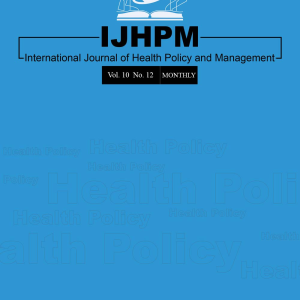
The International Journal of Health Policy and Management has released a special issue on the political economy of food systems, including an editorial, eight review articles and 11 original articles.
The special issue includes:
- The Political Economy of Healthy and Sustainable Food Systems: An Introduction to a Special Issue
- International Trade and Investment Agreements as Barriers to Food Environment Regulation for Public Health Nutrition: A Realist Review
- Achieving Food System Transformation: Insights From A Retrospective Review of Nutrition Policy (In)Action in High-Income Countries
- Redressing the Corporate Cultivation of Consumption: Releasing the Weapons of the Structurally Weak
- Understanding the Political Challenge of Red and Processed Meat Reduction for Healthy and Sustainable Food Systems: A Narrative Review of the Literature
- Addressing Malnutrition: The Importance of Political Economy Analysis of Power
- The Basic Determinants of Malnutrition: Resources, Structures, Ideas and Power
- Policy Action Within Urban African Food Systems to Promote Healthy Food Consumption: A Realist Synthesis in Ghana and Kenya
- “Part of the Solution:” Food Corporation Strategies for Regulatory Capture and Legitimacy
- Benchmarking Food and Beverage Companies on Obesity Prevention and Nutrition Policies: Evaluation of the BIA-Obesity Australia Initiative, 2017-2019
- First Nations Peoples’ Participation in the Development of Population-Wide Food and Nutrition Policy in Australia: A Political Economy and Cultural Safety Analysis
- International Trade and Investment and Food Systems: What We Know, What We Don’t Know, and What We Don’t Know We Don’t Know
- Drawing on Strategic Management Approaches to Inform Nutrition Policy Design: An Applied Policy Analysis for Salt Reduction in Packaged Foods
- Understanding the Impact of Historical Policy Legacies on Nutrition Policy Space: Economic Policy Agendas and Current Food Policy Paradigms in Ghana
- Can Labelling Create Transformative Food System Change for Human and Planetary Health? A Case Study of Meat
- Challenges to Establish Effective Public-Private Partnerships to Address Malnutrition in All Its Forms
- From the Cancer Stage of Capitalism to the Political Principle of the Common: The Social Immune Response of “Food as Commons”
- Finance’s Social License? Sugar, Farmland and Health
- Ultra-Processed Profits: The Political Economy of Countering the Global Spread of Ultra-Processed Foods – A Synthesis Review on the Market and Political Practices of Transnational Food Corporations and Strategic Public Health Responses
- What You Don’t Know About the Codex Can Hurt You: How Trade Policy Trumps Global Health Governance in Infant and Young Child Nutrition
Abstract of special issue’s editorial
Today’s food systems are contributing to multiple intersecting health and ecological crises. Many are now calling for transformative, or even radical, food systems change. Our starting assumption in this Special Issue is the broad claim that the transformative changes being called for in a global food system in crisis cannot – and ultimately will not – be achieved without intense scrutiny of and changes in the underlying political economies that drive today’s food systems. The aim is to draw from diverse disciplinary perspectives to critically evaluate the political economy of food systems, understand key challenges, and inform new thinking and action. We received 19 contributions covering a diversity of country contexts and perspectives, and revealing inter-connected challenges and opportunities for realising the transformation agenda. We find that a number of important changes in food governance and power relations have occurred in recent decades, with a displacement of power in four directions. First, upwards as globalization has given rise to more complex and globally integrated food systems governed increasingly by transnational food corporations (TFCs) and international financial actors. Second, downwards as urbanization and decentralization of authority in many countries gives cities and sub-national actors more prominence in food governance. Third, outwards with a greater role for corporate and civil society actors facilitated by an expansion of food industry power, and increasing preferences for market-orientated and multi-stakeholder forms of governance. Finally, power has also shifted inwards as markets have become increasingly concentrated through corporate strategies to gain market power within and across food supply chain segments. The transformation of food systems will ultimately require greater scrutiny of these challenges. Technical ‘problem-solving’ and overly-circumscribed policy approaches that depoliticise food systems challenges, are insufficient to generate the change we need, within the narrow time-frame we have. While there will be many paths to transformation, rights-based and commoning approaches hold great promise, based on principles of participation, accountability and non-discrimination, alongside coalition building and social mobilization, including social movements grounded in food sovereignty and agroecology.
Reference
International Journal of Health Policy and Management, Volume 10, Special Issue on Political Economy of Food Systems, December 2021
View the special issue’s table of contents here. See also the TABLE explainer An overview of food system challenges and watch a recording of our event An open-ended discussion on 'Power in the food system'.












Post a new comment »